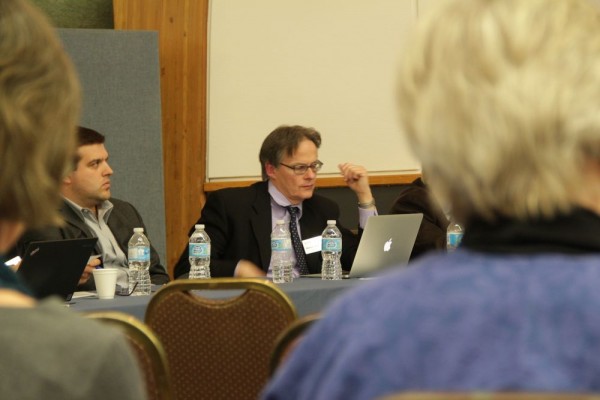
Some of you may have heard that I have resigned as director of the Estonian House Board. This is correct. I resigned on the morning of Jan 17th. My resignation arises from incompatible views concerning corporate governance of an entity such as the Estonian House, and my sense that I can be a more effective contributor to the community off the board than on it.
Unfortunately, an ‘us-against-them ‘mentality has developed between the Estonian House and significant elements of the Toronto Estonian community. I have come to believe that the way the Estonian House Renewal Project has been managed is principally to blame. To my horror, I see the Toronto Estonian community bifurcating along socioeconomic lines. Unless we can step in and bring the warring factions together now — a serious if not insurmountable challenge this late in the process — I think the community rifts that the mishandling of the renewal process has created will be with us for decades to come, long after the fate of the Estonian House has been decided. I have spoken to many people who have vowed to me never to set foot in the new building that is being touted.
It has been said that the mark of a judicious and viable system of governance is one where those whose views have not prevailed still feel that their ideas have been given a fair shake, and thus are left with confidence in the process and loyalty to the decision-making institution. This is definitely not the case right now. Nevertheless, the important thing is not re-hashing the past but rather thinking about how best to move forward.
In my opinion, there are two problems that require immediate attention. The first concerns the flow of information to the public. A policy of openness needs to be established. Instead of restricting debate by restricting access to information, the renewal process — on which the survival of our community depends — should be opened up. As well, all board meetings should be made public (with the sensitive items, and sensitive items only, confined to in camera sessions). We have to remember that the Estonian House is a community center. It is not Apple Corporation or the National Security Agency. Without community good will, the Estonian House is nothing.
The second problem concerns the Estonian House’s corporate governance. Its power structure is ill suited for a community center because its shareholder meetings are dominated by its large shareholders. For instance, at a typical AGM, roughly a third of the votes present come from its largest shareholder. To apply some basic arithmetic, this means that if all the other shareholders present wish to override the will of the largest shareholder, they will need 75% of the remaining votes in order to prevail. If another large shareholder group sides with the largest, then everybody else at the meeting is for all intents and purposes disenfranchised. In this way, two voices can silence the rest of the community. This situation has led to two results: first, the average Estonian House shareholder has come to feel alienated from THEIR house, and second, the board has become unresponsive to the expressed will of the house’s end users.
Advertisement / Reklaam
Advertisement / Reklaam
To solve this problem, the Estonian House must be converted from a share-based organization — where one member can have hundreds of votes —into a member-based organization, where each member has one vote. In such an organization, the majority of votes cast at a members’ meeting would really reflect the desire of the majority of the members present. I have no doubt that if the Estonian House were member-based, the decisions that govern its future and its operations would be completely different, and would enjoy the confidence of all stakeholders.Furthermore, in order to limit the damage to our community, a moratorium should be put into place on all major decisions. In other words, no big decision affecting our cultural home should be made until the Estonian House has been restructured. In this way, the decision we reach about the center of our community will actually reflect the will of our community. We need to ignore high-pressure sales tactics that seek to rush through big decisions because the most important thing at stake is our social cohesion. All other goals are secondary because without a sense of common purpose, we cease to be a community in any meaningful sense. Social cohesion demands that every important decision should not only be legalistically valid but be felt to be morally valid by the community at large. Only decisions reached in a truly democratic fashion — where each voice has the same chance to be heard, and each voice has one vote — can possess this kind of legitimacy.
As an Estonian House shareholder and member of the Toronto Estonian community who is no longer serving on its board, I intend to work publicly towards these goals.
___________________
Mõned teist on ehk juba kuulnud, et ma lahkusin Eesti Maja juhatusest. See on õige, ma esitasin oma lahkumisavalduse 17. jaanuari hommikul. Minu lahkumine oli põhjustatud vastuoludest mis tekkivad sellise organisatsiooni juhtimisel nagu Eesti Maja ja minu tunne, et ma saan olla paremini kasulik meie kogukonnale juhatusest väljaspool kui juhatuses.
Advertisement / Reklaam
Advertisement / Reklaam
Ma pean kahetsusega tõdema, et Eesti Maja juhatuse ja märkimisväärse osa Toronto eesti kogukonna vahel on tekkinud ‘meie nende vastu’ mentaliteet. Ma olen jõudnud järeldusele, et selle mentaliteedi tekkimise peamiseks põhjuseks on viis kuidas Eesti Maja uuendamise projekti on juhitud. Minu suureks kahetsuseks ma näen, et Toronto eesti kogukond on lõhenemas sotsiaalökonoomiliste piiride järgi. Kui me ei saa seda lõhenemist peatada ja osapooled kokku tuua – keeruline kui mitte ületamatu väljakutse nii hilja selles protsessis – siis need kogukonna lõhed, põhjustatud ebakompetentsest uuendamise protsessi juhtimisest, on meiega aastakümneid, kaua peale seda kui Eesti Maja saatus on otsustatud. Ma olen rääkinud mitmete inimestega kes on lubanud mitte kunagi tõsta oma jalga plaanitavasse Keskusesse. On öeldud, et kaalutletud ja elujõulise valitsemise märk on see, kus need kelle visioon ja mõtted ei ole enamuses ikkagi tunnevad, et nende visioonile ja mõtetele on antud küllaldaselt kõlaruumi ja sellega nad lõpuks usaldavad seda protsessi ja otsuste tegemise institutsiooni. Praegu see kindlasti nii ei ole. Siiski, minevikku ei ole mõtet klammerduda, vaid me peame mõtleme parima viisi edasi.
Minu arvates on päevakorral kaks probleemi mis vajavad kohest lahendamist. Esimene probleem on informatsiooni jagamine avalikkusele. Informatsioon peab olema avalik. Selle asemel, et piirata debatti piirates juurdepääsu informatsioonile, see uuendamise protsess -millest meie kogukonna edasikestmine sõltub - peab olema avatud. Samuti peaks kõik juhatuse koosoleku protokollid tehtama avalikuks (konfidentsiaalsed asjad ja ainult konfidentsiaalsed asjad muidugi mitte). Me peame meeles pidama, et Eesti Maja on kogukonna keskus. See ei ole Apple või National Security Agency. Ilma kogukonna hea tahteta ei ole Eesti Majal mingit väärtust.
Teiseks probleemis on Eesti Maja valitsemisvorm. Praegune valitsemisvorm on kogukonna keskuse vajadusteks mittesobiv, kuna aktionäride koosolekud on domineeritud Eesti Maja suurima aktsiaomaniku poolt. Näiteks tüüpilisel aastakoosolekul umbes kolmandik kohalolevatest häältest tuleb suurima aktsionäri poolt. Kui kasutada lihtsat matemaatikat, siis tuleb välja, et kui kõik ülejäänud aktsionärid soovivad suurima aktsionäri soove eirata, siis neil on vaja 75% ülejäänud häältest. Kui keegi teine suuraktsionär hääletab koos suurimaga, siis kõik teised kohalolijad jäävad põhimõtteliselt valimisõigusest ilma. Sellega saavad kaks aktionäri oma tahtmise maksma panna üle kõikide teiste. See olukord on viinud kahele tagajärjele: esiteks, tavaline Eesti Maja aktsionär tunneb ennast võõrandatuna nende OMA majast ja teiseks, juhatus on muutunud maja kasutajate vajaduste suhtes ükskõikseks.
Advertisement / Reklaam
Advertisement / Reklaam
Selle probleemi lahendamiseks peab Eesti Maja muutma aktsiatel põhinevast organisatsioonist – kus ühel osanikul võib olla sadu hääli – liikmetel põhinevaks organisatsiooniks kus igal liikmel on üks hääl. Sellises organisatsioonis on hääletuse tulemuseks enamiku kohalolevate liikmete tahe. Mul ei ole kahtlust, et kui Eesti Maja oleks liikmetel põhinev organisatsioon, siis otsused mis juhivad Eesti Maja tulevikku ja opereerimist oleks täiesti erinevad ja need otsused oleksid usaldatud kõikide sidusrühmade poolt.Veel, et vähendada kahju meie kogukonnale, on vaja paika panna moratoorium kõikide peamiste otsuste suhtes. Teisisõnu, ühtegi otsust mis oluliselt mõjutab meie kultuurilist kodu ei tohiks teha enne kui Eesti Maja valitsemine on ümber struktureeritud. Sel viisil meie otsus mis mõjutab meie kogukonna keskust, peegeldab ka tegelikult meie kogukonna tahet. Me peame ignoreerima pealepressitud müügitaktikat mis proovib läbi suruda elulisi otsuseid, sest kõige olulisem on meie kogukonna kokkukuuluvus. Kõik teised eesmärgid on teisejärgulised, sest ilma ühtse eesmärgita me lakkame olema kogukond igas tähendusrikkas mõistes. Sotsiaalne kokkukuuluvus nõuab, et iga oluline otsus peab olema mitte ainult seaduslik, vaid ka tunduma moraalselt õige laiema kogukonna poolt. Ainult need otsused milleni on jõutud tõeliselt demokraatlikult – kus iga häält kuulatakse ja igal isikul on üks hääl – on otsused mis on kehtivad, usaldatavad ja seaduspärased.
Olles Eesti Maja aktionär ja Toronto eesti kogukonna liige kes ei ole enam Eesti Maja juhatuses, ma kavatsen töötada avalikult nende eesmärkide poole.
























